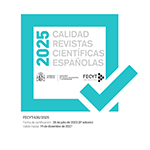The cinema in the writings of Heidegger under the 'III Reich'
Abstract
This work explores and systematizes the conception of cinematography in Martin Heidegger’s work from his first mention in his 1929 seminar –Introduction to Philosophy– to his personal notes and his 1944 seminars. In the first place, we intend to contribute to the clarification of an aspect briefly touched in the studies of his philosophy of art: his conflictive relation with cinema, always understood either as an exhibition process linked to the nihilistic side of the technique (Kino) or as a banal entertainment for the masses (Film). Secondly, we intend to contextualize and explore a collection of texts that can be understood as a more or less explicit discussion with the cultural control mechanisms of Goebbels UFA. We will analyze both those interventions made in public –especially his first seminar on Heraclitus in 1943–, as well as his own private annotations consigned in the Black Notebooks, the Meditations and the Notes.
Downloads
Article download
License
In order to support the global exchange of knowledge, the journal Logos. Anales del Seminario de Metafísica is allowing unrestricted access to its content as from its publication in this electronic edition, and as such it is an open-access journal. The originals published in this journal are the property of the Complutense University of Madrid and any reproduction thereof in full or in part must cite the source. All content is distributed under a Creative Commons Attribution 4.0 use and distribution licence (CC BY 4.0). This circumstance must be expressly stated in these terms where necessary. You can view the summary and the complete legal text of the licence.











